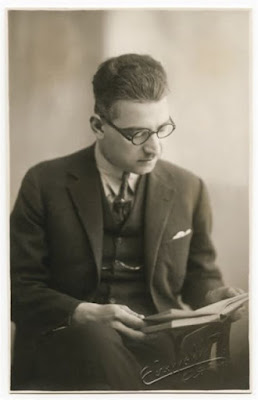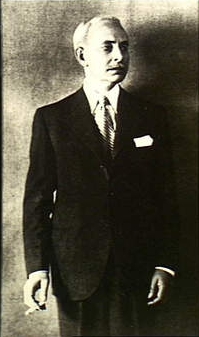Xenophon
Zolotas ΞΕΝΟΦΩΝ ΖΟΛΩΤΑΣ
Plaza, Section A, Number 85
The ‘Professor’
Xenophon Zolotas was one of Greece’s great economists. Wealthy in his
own right, he nonetheless decided to apply his impressive intellect in an effort to steer the economy of Greece onto a course that would lead to its economic
success and better the lives of its people. He held the position of Director of
the Bank of Greece for a record number of years and became world famous for his
economic acumen. Out of all of the many titles bestowed upon him during his
lifetime abroad and at home (including that of Prime Minister during a brief
stint as caretaker in 1989-90), he preferred to be referred to as ‘professor’.
His Life
Xenophon was
born in 1904 with a ‘golden’ spoon in his mouth. His father Efthimios Zolotas,
was one of Greece’s most renowned goldsmiths. The shop he had inaugurated in
1895 on Aiolou Street (then the economic center of Athens) quickly became a
magnet for the Athens elite. He hoped his son would follow in his footsteps and
take over the business. But, encouraged by his mother Constantina, Xenophon opted
for an academic career.
At the age of
24, after studies in Athens, Leipzig and Paris he was
offered the chair of Professor of
Financial Law at the University of Thessaloniki.(1)
Academic life
suited him. Even when Elefterios Venizelos tried to persuade him to become the
general secretary of an Economic Council established to encourage the growth of
the Greek economy, Zolotas chose not to abandon academia where he was quickly
making his mark. As a Keynesian, he believed that the state had an obligation to intervene and
compliment private initiative. He promoted the industrialization of Greece, maintaining
that its future prosperity lay in industrial development and the increase of
its exports.
He would
serve as co-director of the Bank of Greece in 1944-5 immediately after the
liberation of Athens and as its director from 1955 to 1967 (when he resigned
because of the military dictatorship) and again as director from 1974 to 1981.
He would also be made an honorary director of the bank for life because of his
service.
It is hard to
know what is most impressive: his role as director of the Bank of Greece or
that in 1960 he was a member of a select committee dubbed “the Four Wise Men” convened by the OEEC (Organization for European
Economic Cooperation) to promote better cooperation and economic development.
The famous four were: Bernard Clalpier from France Randolf Burgess from
America, Sir Paul Gore-Booth from England, and Xenophon Zolotas from Greece.
In the 1950s, Zolotas gave two notable speeches at the International Bank for Reconstruction and Development. He wanted to highlight the debt the English language owed to the Greek language. He said,
“I always wished to
address this assembly in Greek but I realized that it would all be Greek to all
present in this room. I found out, however, that I could make my address in
Greek which will still be English to everybody. With your permission Mr.
Chairman I shall do it now, using with the exception of articles and
prepositions only Greek words:” He began:
Kyrie, it is Zeus' anathema on our epoch for the
dynamism of our economies and the heresy of our economic methods and policies
that we should agonize between the Scylla of numismatic plethora and the
Charybdis of economic anemia…etc.
While stilted, the point was made! His efforts were
applauded to the extent that his speech made the front pages of the Washington
Post and the New York Times.
Private Life
Xenofon Zolotas
was a cosmopolitan and lived well. A dinner party he hosted might include
poached grouper, guinea fowl with mushrooms, chocolate soufflé, and wine from
the Vati or Averoff vineyards. One assumes all this might be followed by an
expensive cognac and hand-rolled Cuban cigars! In 1958, in the same spirit and
flair, he married the beautiful Kalliroi (Lola) Ritsou an American of Greek
descent and some twenty years younger. She would become a style setter in
Athens, often appearing in gowns adorned with gold and jewels from the House of
Zolotas. They lived in a splendid home on Dionysios Areopagitou with a
wonderful view of the Acropolis.
Here Mrs. Zolotas poses wearing
jewelry by the House of Zolotas. See www.Zolotas.gr
The House of
Zolotas was (and still is) popular with the rich and famous:
Liz Taylor, visiting Greece in 1958
for the premiere of Around the World in 80 Days, became an enthusiastic fan of
both their classical and innovative designs.
An Economy of Extravagance
In the 1970s Zolotas, as Director of the Bank of
Greece, became concerned about the route the Greek economy was taking. In 1977 he
gave a speech to economic journalists entitled Consumption, Investment and
Monetary Equilibrium (Κατανάλωσις, Επενδύσεις και Νομισματική Ισορροπία) in which he said,
The last years have
indicated a tendency to overconsumption along with a parallel deceleration in
investments especially in the field of manufacturing.
Instead of using
savings to invest in industry and agriculture which contribute to an increase
in productive potential and to national productivity, investment is allocated
to residential housing where the contribution to the national productivity is
limited…
His Conclusion?
We are advancing step by step into a
wasteful economy which if we do not take measures to curb, we are not going to
be able to lessen inflation and balance the budget.
Prophetic words…. Greeks continued to
pour their savings into real estate at the expense of other investments. At
least he did not live to see the final humiliation that these ‘tendencies’ had led
the country into by 2008.
Zolotas remained vigorous and active into his
old age, insisting on swimming every day, even in winter. He died on June 11,
2004. His
grave is tucked away on the far west of the Plaza, close to Section 14.
The cross is a distinctive design from the House of Zolotas.
The Map
Footnotes
(1) He
held this post until 1968, when he resigned in protest when the military Junta
came to power in 1967. He was a member of the Board of Directors of UNRRA in
1946 and held senior posts in the International Monetary Fund among others.
















